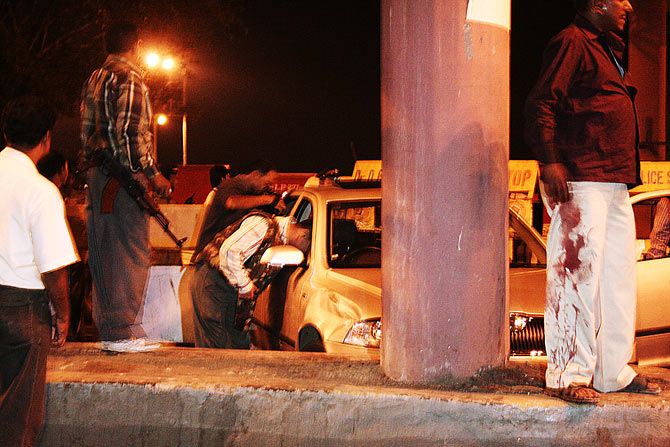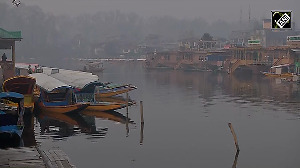'The government, supposedly manned by wise and experienced officers, was all at sea, unable to act cohesively, and with restraint. Each agency was out to score brownie points.' Nitin Gokhale recalls the events of six years ago.
 On the sixth anniversary of 26/11, easily India's most horrific terror attack, everyone has a personal memory.
On the sixth anniversary of 26/11, easily India's most horrific terror attack, everyone has a personal memory.
For some, who lost family members, it is a painful recollection; for others in the police, the NSG, the army and the navy, it is about remembering lessons learnt and failures recounted so as not to repeat the mistakes.
And for those in decision-making positions at the highest level in the national security apparatus it is a day to review the robustness of the response mechanism ostensibly put in place.
To me, as a journalist, the Mumbai attack is a textbook case for bench-marking the interplay between the omnipresent media and state law enforcement agencies during a crisis of such magnitude.
Popular wisdom has it that the media bungled big time during the 72 hour (okay 96 hours, by some reckoning) siege of Mumbai. It displayed insensitivity, gave away security positions to the terrorists by broadcasting live images, came in the way of the security agencies and was generally the biggest nuisance on the scene.
Media behaviour -- especially of broadcast journalists -- has been roundly criticised and justifiably so. Agreed that the media could have and should have behaved more responsibly, should have been more sober and should have been more sensitive. But in defence of my colleagues, I must say this was an unprecedented situation and therefore many reporters reacted in a manner that looks irresponsible -- but only in retrospect.
In the intervening period many internal and institutional discussions have resulted in some kind of guidelines in the broadcast media to prevent a repeat of the 26/11 mistakes.
Will the Indian broadcast media behave any differently than it did during 26/11? Your guess is as good as mine, but given the severe indictment of television news for its various sins of commission and omission during the Mumbai attack, I suspect the exuberance would be tempered if such a situation was to recur. The proof of the pudding is, however, in the eating.
That said, the role of government agencies during the November 2008 crisis also deserves a recap. As someone who was NOT on the spot but was reporting from the national capital on how the security and political establishment handled the terrorist attack of monumental proportions, I had a ringside view of the goings on.
My most abiding memory of those days is the sheer paralysis that gripped the top levels of government. Confusing signals emanated from different power centres: The PMO, the home ministry and the security establishment.
The delay in the arrival of the NSG commandos in Mumbai for want of transport, the sheer confusion in the Maharashtra government and the Mumbai police is too well documented to recount here, but let me draw attention to the sheer violation of basic rules of crisis communication by every arm of the government bar none.
Let's start right at the beginning. Then home minister Shivraj Patil arrived in Mumbai along with the first batch of NSG commandos and grandly announced to the waiting contingent of journalists: 'These 250 commandos will take care of the problem.' There was no need to disclose the numbers, but the home minister himself violated the basic principle.
A couple of hours later, J K Dutt, then the NSG chief, grandly declared at the airport upon his arrival in Mumbai: 'Additional 250 NSG personnel have now joined the operation.' Another unwarranted piece of information given out voluntarily.
At the other end of town, Vice Admiral J S Bedi, then chief, Western Naval Command, paraded the elite Marine Commandos (Marcos) in front of the television cameras, lauding them for their quick action as first responders. Another rule broken: No one shows off their best asset. We still haven't seen how and what the SEALs who killed Osama bin Laden look like although a couple of those who were part of the team have now revealed their identity after leaving the force.
Almost simultaneously, then Mumbai police commissioner A N Roy was voluntarily revealing to the media that one of the attackers -- Ajmal Kasab -- was caught alive even as the operation to clear the Taj, Oberoi and Nariman House was on. Another fundamental rule broken: Never give vital information when the operation is still in progress!
This was not all. Lieutenant General Nobel Thamburaj, then the Southern Army Commander based in Pune, flew to Mumbai and grandly announced with one of the burning hotels as the backdrop: 'This operation will be over in another couple of hours.' He was off the mark by 48 hours.
Then there was R R Patil, Maharashtra's then home minister, known to make profound statements. 'Bade bade saharoein mein aisi chhoti chhoti ghatnaye hoti raheti hein (Such small incidents often occur in big cities),' he told the media.
The icing on the cake was yet to come.
As the NSG commandos started gaining control, the scene of action shifted to Nariman House, a building located in a narrow alley. The only possible access was from the rooftop. So Indian Air Force helicopters were called in.
Even as television channels started beaming visuals of the choppers hovering dangerously close to the building (absolutely unacceptable for us in the media to have done so), I got a call from a senior officer at Air HQ in Delhi: "Why don't you take my phone in? I can tell your viewers what a difficult job our brave pilots are doing."
In retrospect, I should have refused, but that I didn't shows how we all get caught in the immediacy of news and rarely think of the consequences.
If we in the media made major mistakes, the government, supposedly manned by wise and experienced officers, was also all at sea, unable to act cohesively and with restraint. Each agency was out to score brownie points, ignoring the basic principle of the need to have a single point communication centre.
Lack of ability to take control of the situation resulted in multiple voices speaking for the government, showing India in poor light across the world.
Have matters improved?
I don't have a definite answer six years after the event. Let's pray that they have.
Nitin Gokhale is one of India's leading strategic affairs experts.
Image: November 26, 2008, after midnight: After terrorist Ajmal Kasab's capture, a team of policemen check the Skoda Laura that he and his accomplice commandeered at Nariman Point and drove down Marine Drive. Photograph: Uttam Ghosh/Rediff.com
Read excerpts from Nitin's books...










